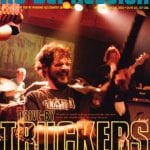Scott Miller – When you write a good song and you know it
ND: There’s a different sort of “roots” throughout your music, of course, which is this clearly broad rock ‘n’ roll background. It’s possible, in your music, to find references to everything from ’50s doo-wop to Buck Owens to indie rock. Somewhere, rock sounds came into your life. What did Scott Miller’s high school record collection look like?
SM: Like the twelve albums for a penny that you got from Columbia. At my 10th birthday, Kiss was in their heyday; I was Kiss Army fodder. But my older sister gave me Abbey Road. Like every other singer-songwriter, I started with Dylan, in moving from the folk stuff. When I went to college I’d still not even heard of the Violent Femmes or R.E.M.; but when I heard them, it was like “Well, that’s OK then.”
ND: College was William & Mary. Was southern pop of the, say, Big Star or beach music varieties impacting you then?
SM: Are you kiddin’? I didn’t even drink; I spent those four years studying and sitting in my room playing the guitar. I loved Neil Young — who is somebody who can do solo and band — but, this is not feigned ignorance. The first rock I played was with the V-Roys. Well, I played with Greg Smalley in Atlanta some, in the band the Diggers.
II. YOU USE THE ERASER A LOT MORE THAN USE THE OTHER END OF YOUR PENCIL
ND: Has the Commonwealth evolved from a loose conglomeration to a set working band now?
SM: I’m a working songwriter guy; that’s what I do. To go out and do these shows, I’ve got to be able to keep a band. At least I had enough foresight to call it the Commonwealth! It’s not a band the way the V-Roys were; you didn’t have to tell anybody what to do there. Everybody did their job and we traveled together well.
ND: There’s a set bunch of guys on the new Upside Downside CD, and contributions like Eric Fritsch’s organ and accordion work are marked, for instance.
SM: Well yeah. He and I co-produced it, and I’ve played with him for the last nine months or a year. But there’s still no set Commonwealth.
ND: With the V-Roys, you were co-leader of a band pretty widely heralded even outside of the roots-rock arena. Some good music got made. What happened?
SM: The same story as a million others. We were a band; I know we were. E-Squared and Warner Bros. fell out, and there was no way to go farther up or out. And I think Jeff Bills and Paxton Sellers didn’t enjoy the road as much as Mic Harrison and I did — and that’s not a happy van.
Mic and I played a few V-Roys songs on the radio here in town, live at a club, just this week; I was amazed how many people there hadn’t heard of them by this point! Time’s gone by.
ND: What did you take from those years, as writer and performer?
SM: Writing for the band was new. And traveling — shit, man, I hadn’t been anywhere. I couldn’t wait to see the midwest for the first time. And I learned how to read in the car without getting sick!
ND: Did the V-Roys’ work with Steve Earle and Ray Kennedy impact how you see the making of songs and records?
SM: Those were the first real records I ever made. It was, “What the hell is a compressor? MIDI, meet troglodyte; troglodyte, meet MIDI.”
Steve has always been real encouraging on the songwriting. He’s the one who taught me about editing. You use the eraser a lot more than you use the other end of your pencil, till it’s right, and it flows and you don’t have a line you put there just to get to the next verse. That you need to rewrite that verse, and you can’t be afraid. Oh, and that you can only really do that in the morning — sober!
ND: Did any of that make you more interested in collaborating as a songwriter?
SM: I definitely love to write alone, probably because I’m a selfish bastard. You try to find something in your song that you can connect with, so when you play it or record it or people listen to it, you’re in there.
ND: How do you go about it? Are you prolific?
SM: This new album is the first album that I had to write for without songs piled up — where I took off from the road last summer to fix up this little hut behind my house and then sat down. It was, “Well, what are you gonna do now?”
III. THE WHOLE COUNTRY IS BECOMING LESS DISTINGUISHABLE
ND: There are a lot of southern themes in your songs. How much did where you come from really affect the sounds you make?
SM: It affects everything about you. That’s the point I was trying to make with the Thus Always To Tyrants CD (2001) — how geography effects your thought. I grew up in a big beautiful valley with mountains on either side. In some ways, it was a neat box. The people in that valley, including my family, are all of Scotch-Irish and German descent, Presbyterian and Methodist, and they look at their watches at 12 o’clock when church is supposed to be over. It’d better be over!




